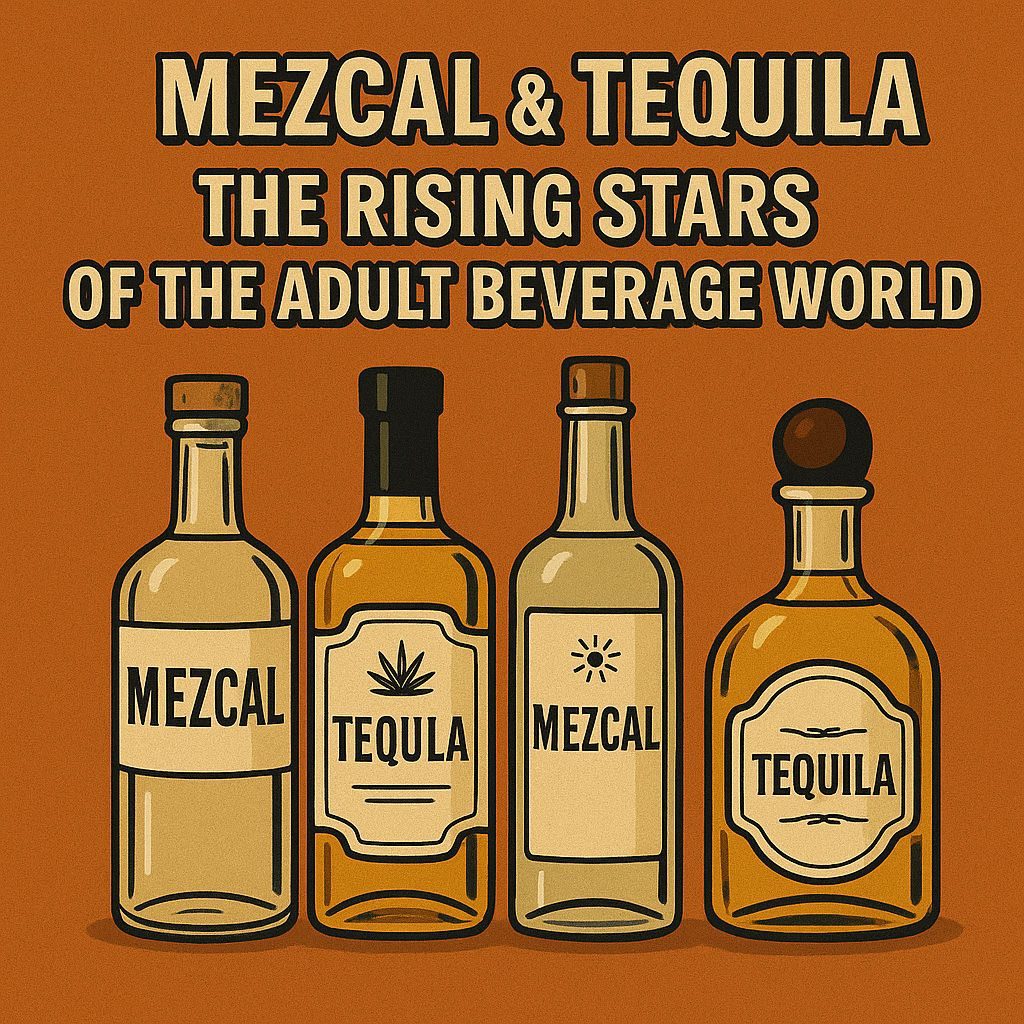- Consumer & Market Trends Newsletter
- Posts
- Mezcal & Tequila
Mezcal & Tequila
The Rising Stars of the Adult Beverage World

Introduction
The world of spirits is experiencing a renaissance, and at the heart of this transformation are two Mexican icons: mezcal and tequila. Once regarded as niche or even rustic, these agave-based spirits have surged into the global spotlight, captivating consumers with their authenticity, craftsmanship, and rich cultural heritage. This newsletter explores why mezcal and tequila are so important, how they’re shaping the adult beverage category, and why now is the perfect time to discover their stories.
Mezcal vs. Tequila: Understanding the Difference
Tequila is a type of mezcal made exclusively from blue Weber agave and produced in specific Mexican regions, primarily Jalisco. Its production is tightly regulated, resulting in a spirit known for its clean, smooth profile, often with notes of citrus, herbs, and sometimes vanilla or caramel, especially in aged varieties.
Mezcal is more diverse. It can be made from over 36 agave species, with each species and region imparting unique flavors. Traditional production methods, such as roasting agave in underground pits, give mezcal its signature smoky, earthy character. Mezcal is primarily produced in Oaxaca but is also crafted in eight other Mexican states.
Spirit | Agave Species Used | Production Regions | Typical Flavor Profile |
|---|---|---|---|
Tequila | Blue Weber Only | Jalisco + 4 other states | Smooth, citrus, herbal |
Mezcal | 36+ species | 9 Mexican states (mainly Oaxaca) | Smoky, earthy, complex |
Key Facts & Industry Insights
Market Growth: The global mezcal market was valued at approximately $1.14 billion in 2024 and is projected to reach $1.85 billion by 2030, growing at a CAGR of 8.4% to 10% depending on the source. The U.S. is the largest market, with Asia-Pacific showing the fastest growth rates, driven by urbanization and a growing middle class12345.
Premiumization: Consumers are increasingly seeking premium, authentic products. Mezcal’s artisanal appeal and tequila’s refined expressions are drawing in discerning drinkers willing to pay more for quality. This trend is especially strong among millennials and younger consumers who value unique flavors and craftmanship12367.
Production & Exports: In 2024, over 11.3 million liters of mezcal were produced, with 8.2 million liters bottled for export. Oaxaca remains the top producer, but other states like Durango and Michoacán are gaining traction8.
Sustainability: The rapid growth in demand has sparked urgent conversations about sustainable agave farming and responsible production. Issues like deforestation, wild agave depletion, and water contamination are at the forefront, with both challenges and innovative solutions emerging from within the industry910111213.
Cultural Significance: Mezcal and tequila are deeply woven into the fabric of Mexican identity, celebrated in festivals, rituals, and daily life. Their production supports rural communities and preserves centuries-old traditions.
The Importance of the Category
Economic Impact
Job Creation: The rise of mezcal and tequila has created jobs across the supply chain, from agave farmers to bartenders and marketers. This growth is especially impactful in rural regions of Mexico, where agave cultivation and spirit production are lifelines for local economies12.
Global Investment: Major beverage companies and celebrities are investing in the category, driving further innovation and expanding global reach. Acquisitions of artisanal producers by international spirits giants are common, as seen with Bacardi’s purchase of ILEGAL Mezcal3.
Export Powerhouse: Mezcal and tequila exports continue to set records, with the U.S. leading as the top importer. The spirits’ popularity in high-end bars and restaurants worldwide is fueling further demand812.
Cultural Heritage: Mezcal is more than a drink; it’s a symbol of Mexican resilience, identity, and hospitality. Its role in festivals, weddings, funerals, and rituals underscores its deep-rooted significance141516.
Community Support: Many mezcal producers are small, family-run operations committed to traditional methods. Supporting these artisans helps preserve cultural heritage and sustains local economies14.
Innovation in Cocktails: Bartenders and mixologists are embracing mezcal and tequila for their versatility, leading to creative cocktails that are reshaping bar menus worldwide. This innovation is helping to introduce these spirits to new audiences.
Notable Brands to Explore
Sin Pina Mezcal: A rising artisanal mezcal brand known for its complexity and commitment to traditional methods. Sin Pina is celebrated for its use of wild agave and small-batch production, resulting in unique flavor profiles that appeal to aficionados and newcomers alike.
G4 Tequila: A highly respected tequila producer from Jalisco, renowned for its pure, additive-free approach and dedication to family tradition. G4 emphasizes sustainability and transparency, making it a favorite among tequila purists.
Opinion: Why Mezcal Deserves Your Attention
Mezcal is not just another spirit, it is a liquid expression of place, tradition, and time. Each bottle tells a story that stretches back centuries, shaped by the land, the agave, and the hands of the people who make it. As mezcal’s popularity grows, it’s vital to recognize both the opportunities and the responsibilities that come with this global spotlight.
The Allure of Authenticity
What sets mezcal apart is its authenticity. In a world where so many products are mass-produced and homogenized, mezcal stands as a beacon of individuality. Each batch is a testament to the artistry of its maker, no two bottles are exactly alike. The spirit’s diversity, derived from dozens of agave species and distinct regional terroirs, offers a tasting adventure that is both educational and exhilarating.
The Challenge of Growth
However, with popularity comes pressure. The surge in demand has led to concerns about sustainability. Wild agave populations are under threat, and traditional production methods, while environmentally friendly in small quantities, can become problematic at scale. Issues like deforestation (for roasting pits), water contamination (from distillation byproducts), and the use of chemical fertilizers must be addressed if mezcal is to have a sustainable future.
There is also a risk that the soul of mezcal, its artisanal, community-based roots, could be lost to commercialization. As large companies enter the market, there is a temptation to prioritize efficiency and profit over tradition and quality. This is not unique to mezcal; it’s a challenge faced by any craft product that becomes globally popular.
The Responsibility of the Consumer
As consumers, we have a role to play. Choosing brands that honor traditional methods and prioritize sustainability helps ensure that mezcal’s unique character is preserved. Supporting small producers, asking questions about sourcing and production, and being willing to pay a premium for authenticity are all ways to contribute positively to the industry’s future.
Mezcal as a Bridge
Mezcal is also a bridge between past and present, between cultures, and between people. Sharing mezcal is an act of hospitality and connection. In Mexican villages, offering mezcal is a gesture of friendship and respect. In urban bars around the world, mezcal brings people together in celebration of something genuine and special141516.
The Future: Innovation and Tradition
The future of mezcal lies in balancing innovation with tradition. Creative bartenders are introducing mezcal to new audiences through inventive cocktails, while forward-thinking producers are exploring sustainable practices and new agave varieties. Meanwhile, the heart of mezcal remains unchanged: it is a spirit rooted in the land and the people of Mexico.
For those seeking more than just a drink for those who want a story, a connection, and a sense of place—mezcal is the spirit to watch. Its smoky, layered flavors invite contemplation, conversation, and appreciation. As we look ahead, let’s celebrate mezcal’s rise not just as a trend, but as a movement that honors heritage, supports communities, and inspires new possibilities.
Resources & Where to Learn More
Educational Guides & Brand Lists:
Industry Reports & Trends:
Sales & Marketing Resources:
Community & Support:
Final Sip
The mezcal and tequila category is more than a fleeting trend, it is a dynamic movement blending history, innovation, and sustainability. Whether you’re a curious newcomer or a seasoned aficionado, there has never been a better time to explore the world of agave spirits. Choose wisely, drink responsibly, and savor the story in every sip.
Key facts and insights sourced from Grand View Research, Precedence Research, Mezcalistas, Mezcalum, and other leading industry and cultural
